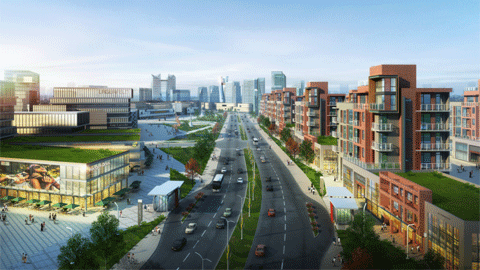The UAB to offer studies in the management of smart and sustainable cities

01/06/2017
Next academic year, the UAB will offer a new programme in the management of smart and sustainable cities, the first of its kind in Spain. On 1 June the UAB Governing Council approved the creation of the course, which will consist of a three-year UAB-specific programme (180 ECTS credits) starting in 2017/18, with the aim of becoming an official bachelor's degree in the following year. The university however will be offering it at the same subsidised price as other bachelor's degrees offered by the School of Engineering. The contents of these studies make up a largely interdisciplinary programme including the School of Engineering, the Faculty of Political Science and Sociology, the Faculty of Business and Economics, and the Faculty of Arts and Humanities. Sixty place will be available this first year.
The programme will provide students with the training needed to be able to understand, manage and contribute to the governing of new urban realities appearing thanks to profound economic, social and technological transformations associated with globalisation. Students will receive training in different disciplines, with a main focus on engineering, urban geography and geographic data and information. They will acquire capacities in the fields of social and political sciences and be provided with a solid technological base; in order to achieve this they will receive a highly cross-curricular training covering social, legal, economic, cartographic and technological aspects, as well as in the fields of urban planning, infrastructures, mobility, services and facilities, cultural diversity, social inequality, energetic and natural resources, etc.
The goal of managing smart and sustainable cities is to apply information and communication technologies (ICTs) to make urban areas economically more competitive, environmentally more efficient, and socially more just, thus contributing to improving the quality of life of its inhabitants. Students will learn to apply these ICTs to solving city management problems related to contamination, security, traffic, waste collection, service providers, sustainable mobility, accessibility, citizen participation, tourism, etc.
They will receive interdisciplinary training in mathematics, physics, computer sciences, urban geography, mapping and geographic data and information, urban management and planning, sensors and digitalisation, information systems, urban dynamics, geomatics (gathering and analysis of geographic information), communications systems, data management and analysis, business, open innovation, political science, cyber-physical systems and robotics. Among the skills they will acquire are the development of management and integration platforms for citizen services by using technologies and systems for data sensing, acquiring, processing and communicating. They will also be capable of solving urban management problems using knowledge and procedures in design and implementing computer applications.
Upon graduating, students will be able to choose from a variety of career options:
- Developer and analyst of geospatial applications
- Developer of smartphone applications
- Responsible for scientific, public or commercial projects working on geospatial applications and services
- Responsible for geospatial information products and services
- Responsible for service companies (water, gas, energy)
- Responsible for publicly administered waste management
- Responsible for publicly administered mobility management
- Specialist in integration of urban data and citizen services
- Responsible for digital social innovation strategies
These professional profiles are perfectly adapted to the needs of areas such as engineering companies and urban consultancies, public service companies, transport companies and administration, traffic consultancy firms, mapping and geographic information companies and services, new firms offering geodata services and services for connected and smart cities, provides of devices and technologies for urban networks and other areas such as cultural management, community participation, environmental management and the social economy.
A Transverse Campus
There are currently several master's degree programmes related to the subject of smart cities, but no undergraduate programmes. The UAB is able to offer these studies thanks to being a campus university with a School of Engineering and a Department of Geography characterised by the renowned quality of its academic and research activity.
With regard to geography and territorial studies, the UAB includes the Centre for Demographic Studies, the Institute of Environmental Science and Technology, the Mobility, Transport and Territory Studies Group, the Research Group in Water, Territory and Sustainability, the Research Group in Methods and Applications in Remote Sensing and Geographic Information Systems, the Observatory for Urban Planning and the Energy, Territory and Society Study Group.
With regard to the School of Engineering, there are several research groups in the field of chemical engineering, biology and the environment; information and communication engineering; computer sciences; telecommunications and systems engineering; electronic engineering; computer architecture and operating systems; and microelectronics and electronic systems. In addition, the campus is home to leading centres such as the Computer Vision Centre and the Artificial Intelligence Research Institute.
The strategic importance the UAB gives to the field of smart cities was specified in the creation of the CORE Smart & Sustainable Cities, one of the three strategic research communities launched by the university (the other two focus on cultural heritage and mental health). The CORE are collaboration networks formed by research groups and centres. Therefore, the CORE Smart & Sustainable Cities is made up of specialists from different areas related to the management of sustainable urban environments.